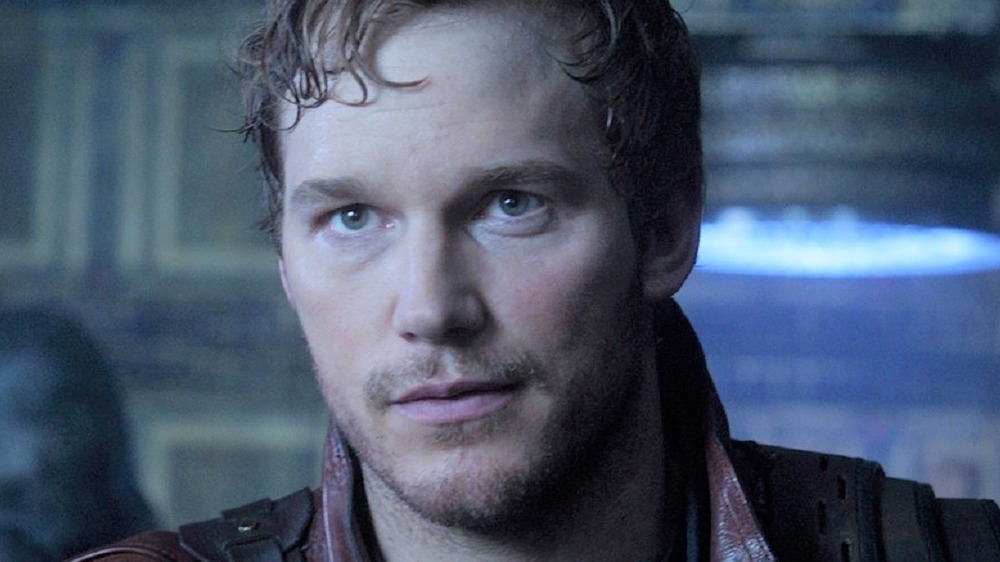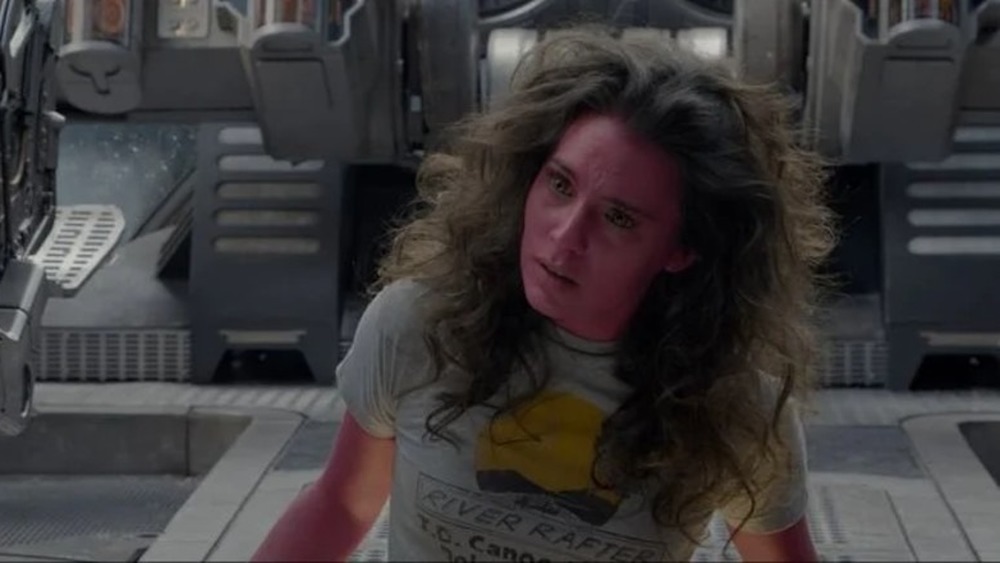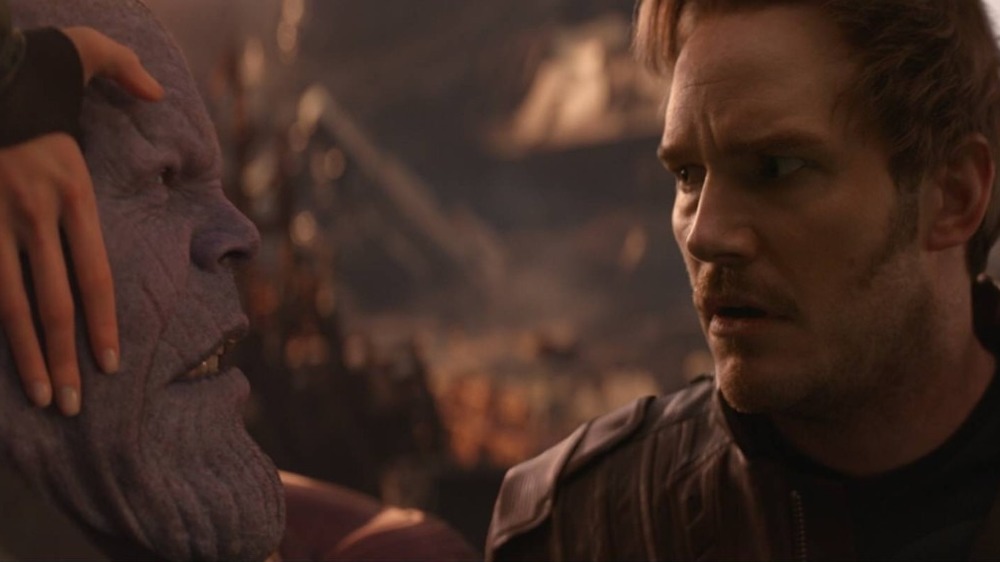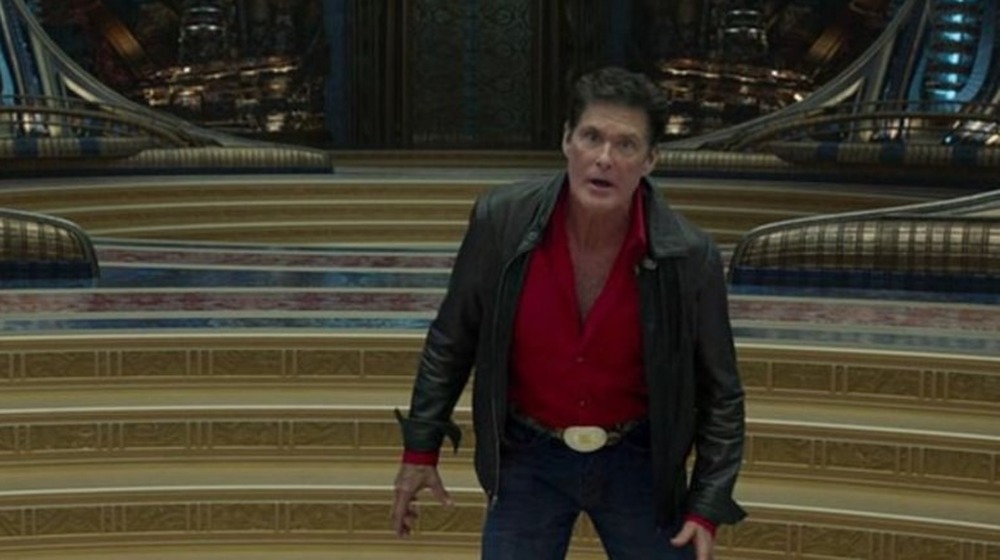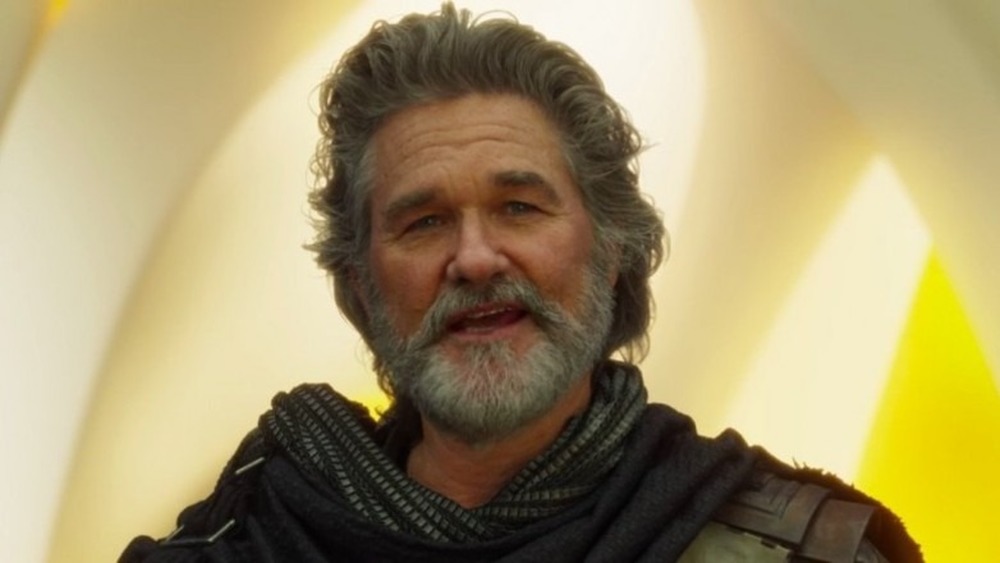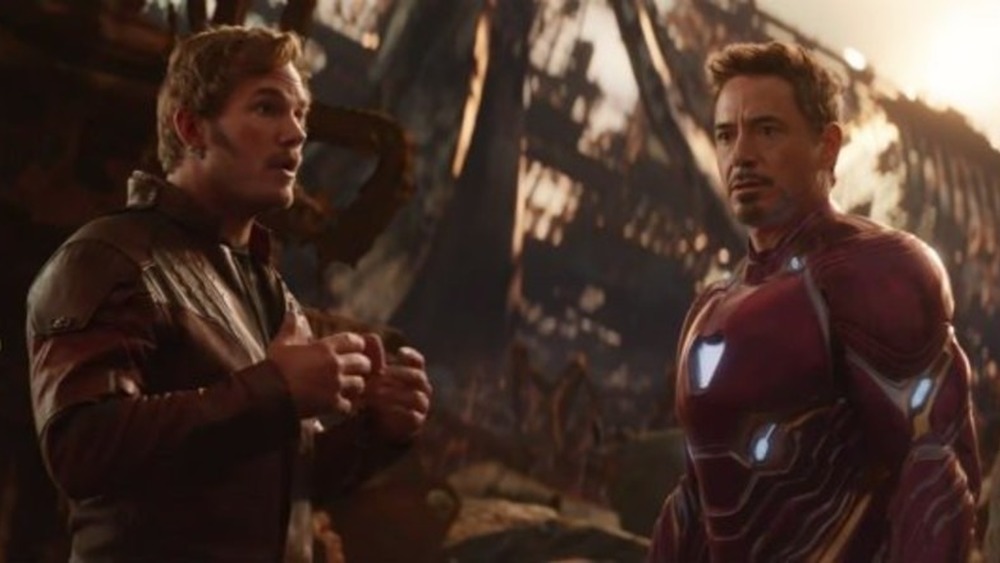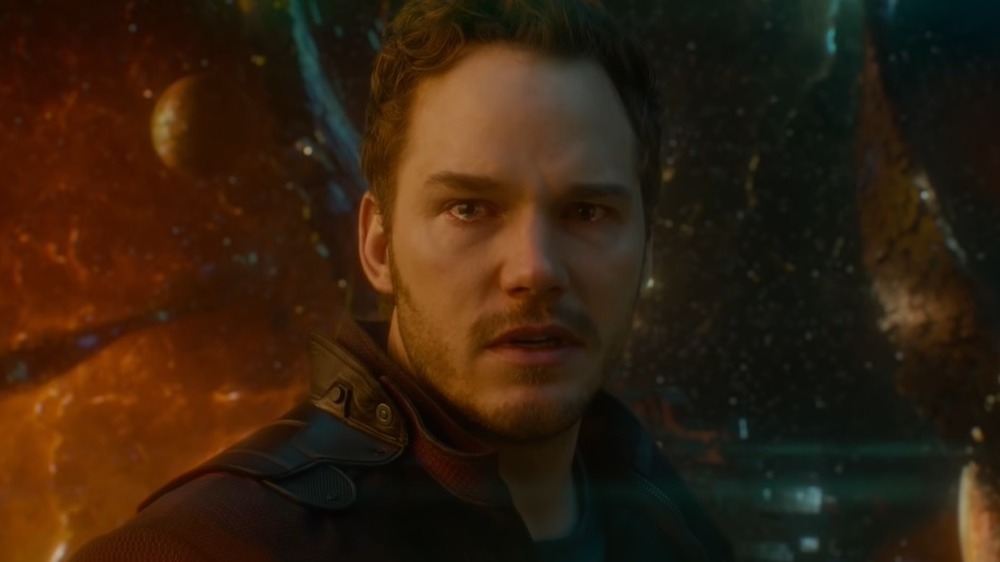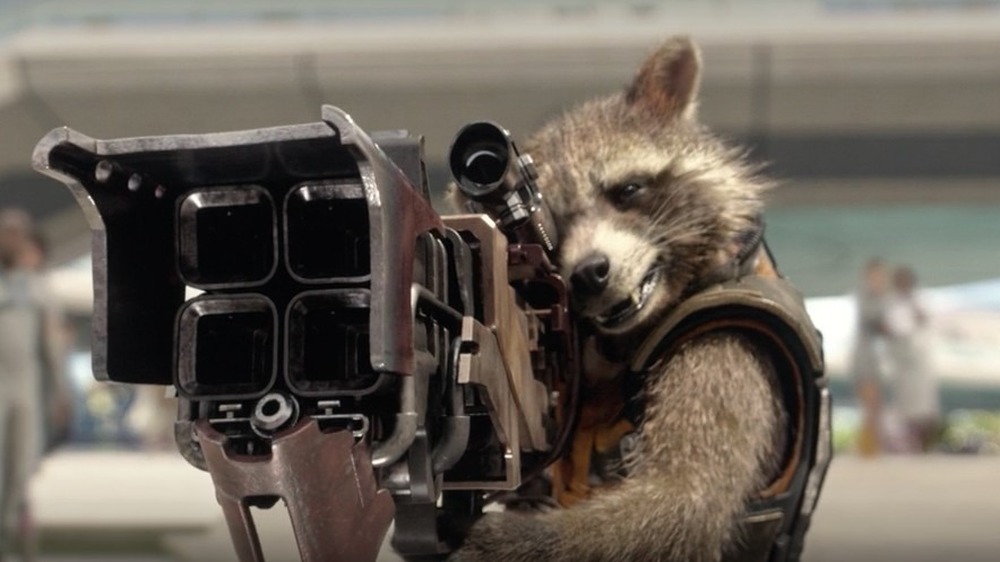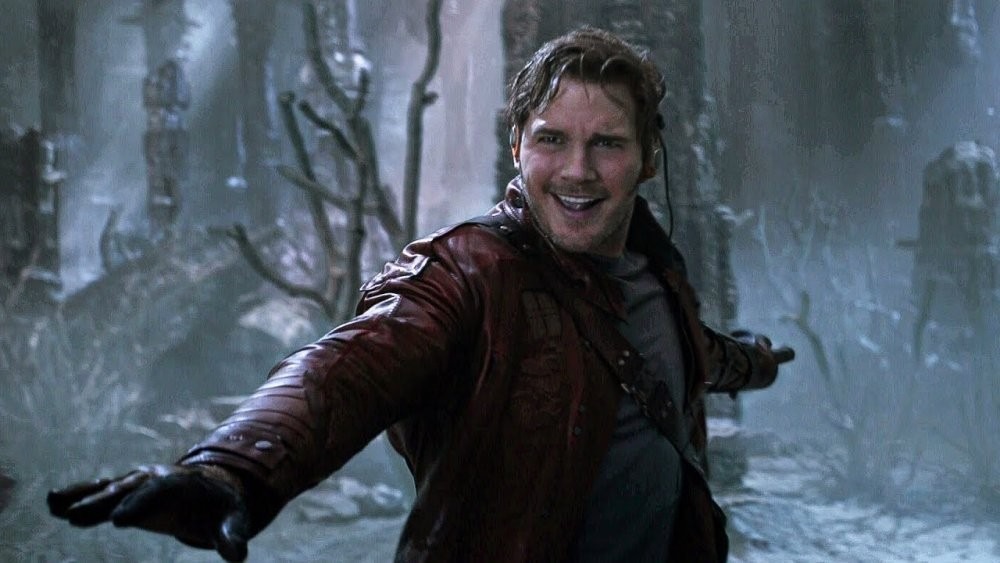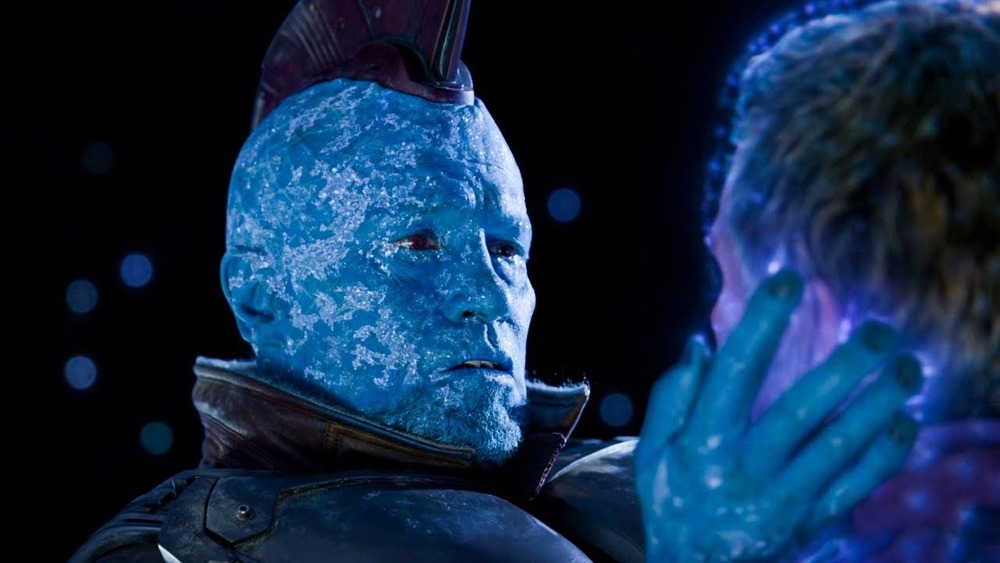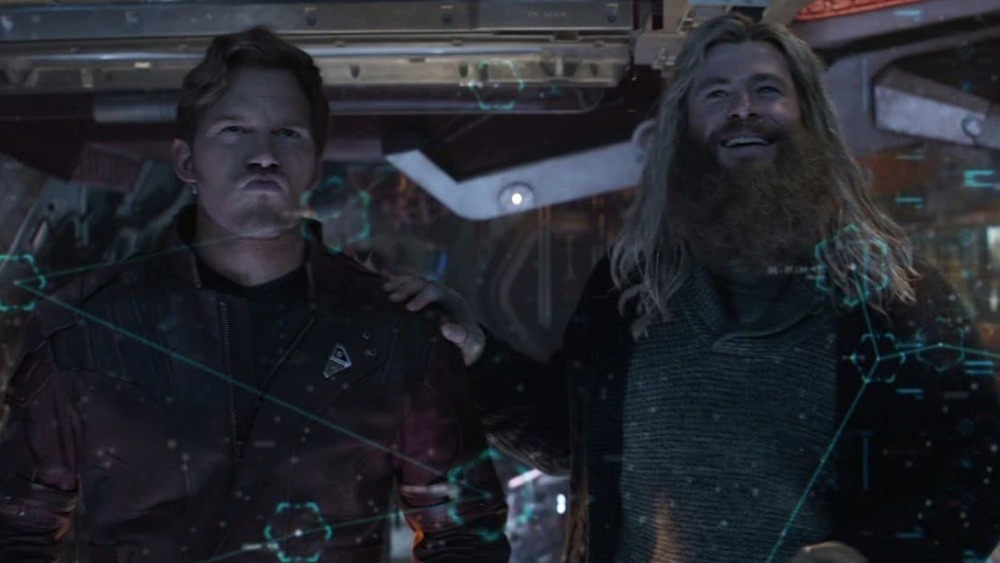Rules Star-Lord Has To Follow In Every MCU Movie
When you think of Chris Pratt's Star-Lord, "predictable" may not be the first word that comes to mind. The leader of the Guardians of the Galaxy can at times feel more like an interstellar pirate than a galactic superhero. After all, he doesn't have a bottomless cache of wealth to fall back on like Tony Stark (Robert Downey, Jr.), so as much as he and his crew of heroes care about saving lives, the universe, and everything, they also have a bottom line to worry about.
But the truth is that Peter Quill has some distinct behavior that tends to repeat in pretty much every movie he's in, including his relatively brief appearances in the Avengers movies. Plus, in addition to what Star-Lord actually does himself, the same kind of things seem to happen to the Guardians leader every time he gets in front of the camera. For a better idea of what we mean, keep reading to learn the rules Star-Lord needs to stick to in every MCU movie.
Star-Lord always disappoints women
Star-Lord tends to leave his romantic partners disappointed. We learn this about the space adventurer right after we meet him in 2014's Guardians of the Galaxy. When he acquires the Orb on Morag and escapes Korath (Djimon Hounsou) and his henchmen, Star-Lord is surprised by the appearance of Bereet (Melia Kreiling) aboard the Milano. Not only does he admit to the Krylorian that he didn't remember she was on the ship, but it's clear he doesn't even remember her name.
Later, as he's trying to convince Drax (Dave Bautista) to spare Gamora (Zoe Saldana), he tells the Destroyer a couple of stories that proves disappointing women badly enough that they physically attack him is fairly common for Star-Lord. Plus, in the very same film, he lets down Gamora — who's just starting to trust him — by suggesting that instead of bringing the Orb to the Nova Corps, they hand it over to someone "who's not going to arrest us, who's really nice, for a whole lot of money." A little later, he risks his own life to save Gamora from dying in space, but he follows that up by nearly breaking his arm patting himself on the back for it.
This disappointing behavior follows Star-Lord throughout the franchise. In 2017's Guardians of the Galaxy Vol. 2, Gamora finds Quill's initial unwillingness to see through Ego's (Kurt Russell) facade more than a little disheartening. And in 2019's Avengers: Endgame, the Gamora from 2014 is just plain disappointed to learn her future counterpart would end up dating someone like him.
He makes lots of mistakes in the MCU
No one's perfect. We all make mistakes. But Peter Quill has made some pretty big ones — including at least one error that changed the course of galactic history.
In the first Guardians, Quill flirts with Gamora on the planet Xandar — playing with the hotly sought-after Orb likes it's a baseball — and opens himself up to her assault. In the sequel, he trusts Ego, who turns out to not only be a mass murderer of his own children but the guy who gave Quill's mother the cancer that killed her. In the same film, he fails to keep an eye on Rocket (Bradley Cooper), whose pointless theft makes an enemy of Ayesha (Elizabeth Debicki). And in Endgame he makes the mistake of rushing up to embrace a Gamora he hasn't met yet, who makes him pay for that mistake pretty decisively.
Of course, there's Star-Lord's most famous mistake — going all bad cop on Thanos (Josh Brolin) in 2018's Avengers: Infinity War. While his emotional outburst is understandable considering the circumstances, the heroes are seconds away from removing the Infinity Gauntlet from the villain's hand. Tragically, Quill's attack gives Thanos the wake-up he needs to escape from the psychic grasp of Mantis (Pom Klementieff).
Star-Lord loves making pop culture references
Star-Lord is always making pop culture references, and honestly, it's kinda surprising that Peter Quill knows so much about TV, movies, and music, considering how young he was when he was abducted. Plus, it's a bit shocking that some of the aliens he encounters seem to understand what he's talking about every now and then.
In the first Guardians flick when he captures the Orb, Quill calls Kortah's Sakaaran troops "Teenage Mutant Ninja Turtles." After he gets pinched by the Nova Corps, he references The Maltese Falcon and Raiders of the Lost Ark. In Knowhere, he teaches his comrades about John Stamos of Full House fame, and of course, when he tries to teach Gamora to dance, he tells her the "legend" of Kevin Bacon and Footloose.
In the sequel, the wealth of pop culture references leads to one of them — David Hasselhoff – literally showing up to confront Star-Lord through Ego. And during a disagreement with Gamora, he almost starts a whole new argument over the meaning of "Sam & Diane" — the on-again/off-again couple on the hit sitcom Cheers.
While there isn't much time for such references in Endgame, in Infinity War, he learns to his dismay that the rest of Earth doesn't necessarily share his opinion on Footloose. He also promises to get a Bowflex when Rocket and Drax make comments about his weight, but we're guessing he didn't have time for that before Thanos' snap.
He always has some kind of huge revelation about his family and loved ones
In all of his MCU appearances, Star-Lord experiences a powerful revelation about a loved one or family member — either from his biological family or his found one. Sometimes that revelation is little more than shocking news, and other times, it comes as life-changing epiphany.
Close to the end of the first Guardians film, Star-Lord learns from Nova Prime (Glenn Close) that his father isn't human. This was something Quill's mother told him on her deathbed, but before speaking to the Nova Corps, Quill had good reason to believe his mother wasn't in her right mind. More importantly, during his vision of his mother in the film's climax, he realizes that he's refused to face his mom's death since his abduction, and it's something he needs to do before he can move on.
In the sequel, Star-Lord learns even more about his family, and a lot of it isn't good news. He discovers the identity of his father, Ego (Kurt Russell), along with the dark truth that his father killed his mother and countless siblings. And shortly before the death of Yondu (Michael Rooker), Quill is blessed with the truth that while he wasn't his biological father, the blue-skinned Ravager was his dad all along, as imperfect as he was.
However, the revelations he receives in his Avengers appearances are sadly more traumatic than anything else. First, he learns of Gamora's murder, and later, he discovers the existence of a living, time-lost Gamora.
Star-Lord always starts an argument about something silly
If nothing else, when everyone's back is to the wall and the stakes are as high as they can be, you can always count on Star-Lord to get into a passionate disagreement about something that just doesn't matter.
These petty conflicts often pop up between Star-Lord and Rocket. For example, in the first Guardians movie, Quill starts breaking down his big plan, only to start an argument over whether or not the talking raccoon's laugh is fake (and yeah, it totally is), as well as whether or not he's ripping off Rocket by saying, "I have a plan." And of course, there's the debate the two Guardians have over who will pilot the Milano through the quantum asteroid field in Vol. 2, which leads to the ship hitting one of the asteroids and crashing on Berhert.
The bickering gets to a new, absurd height in Infinity War. Star-Lord's feelings of inadequacy toward Thor (Chris Hemsworth) make him get into a ridiculous exchange with the thunder god about which one is faking an accent (spoiler — it's Quill), not to mention his initial annoyance at Gamora examining Thor's arm. And it doesn't help matters when he constantly clashes with Iron Man and Spider-Man (Tom Holland) on Titan over who's less intelligent and which team is better.
Star-Lord is very emotional when it comes to the people he cares about
While Star-Lord tries to come off as cool and unflappable, he can get pretty emotional in his MCU appearances, and these moments almost always involve his family.
In the first Guardians film, he openly weeps during the vision of his dying mother (Laura Haddock). He's less weepy and more enraged in Vol. 2 when Ego reveals that he put a tumor in Quill's mother's brain, and Quill doesn't hesitate to unleash a volley of gunfire on the Celestial. Understandably, we see him cry once more when he witnesses the death of Yondu, though considering their exchanges in the previous movie, it's a little surprising.
And Chris Pratt is never more believable while channeling his Marvel character's pain than when he's reacting to the death of Gamora in Infinity War ... and not just once but twice. There's his brutal attack on Thanos after he learns of his lover's actual murder, and there's also the powerful moment on Knowhere, when Quill believes he's about to kill Gamora himself because of the promise he made to her earlier. Thanos uses the Reality Stone to transform Star-Lord's gunfire into harmless bubbles, but it doesn't make the pain on the hero's face any less real.
He gets beat up a whole lot
One of the things that always manages to give Star-Lord strong Han Solo vibes is that, like the Star Wars smuggler, he spends so much time running away from fights that once he's left no choice but to stand his ground, it can be surprising to see how good a fighter he really is. Regardless, he still regularly gets the tar beaten out of him.
Rocket takes quite a bit of sadistic pleasure from turning Star-Lord into a quivering mass of flesh the first time they meet each other in the first Guardians movie. Quill doesn't fare much better — at least not at first — against the bald, blue-skinned prison guard who steals his Walkman when he's brought to the Kyln. And in spite of a passionate outburst, it's only thanks to the arrival of the Guardians in Vol. 2 that Quill doesn't spend the rest of his life as a battery for Ego.
In the battle on Titan in Infinity War, Quill doesn't do any better against Thanos than the rest of the assembled heroes. Granted, in the final battle of Endgame, Star-Lord does a lot better against Thanos' footmen ... but not so well when he's surprised by the knee of the time-lost Gamora. And earlier in the film, all it takes for War Machine (Don Cheadle) to interrupt Quill's dance on Morag is a single sucker punch to the head.
This MCU hero always finds time to sing and dance
You can accuse Star-Lord of being petty, and you can accuse of him of being too impulsive, but you cannot say the man doesn't sing or dance enough. In accordance with their oft-stated prejudices in the 1982 single "The Safety Dance," the members of Men Without Hats would clearly find a friend in Peter Quill.
The very first scene in which we meet the hero — at least, the adult version of the hero — features him dancing and lip-synching on the inhospitable planet of Morag to Redbone's "Come and Get Your Love." Of course, later he tries and fails to woo Gamora with his dancing, and he also uses a dance-off as a distraction against Ronan the Accuser (Lee Pace) in the film's climax. He has a little bit better luck coaxing Gamora into a dance in Vol. 2 while they're on Ego's planet, and they cut a rug to Sam Cooke's "Bring it on Home to Me."
Just about everyone else aboard the Benatar joins Quill in grooving to the Spinners' 1976 hit "The Rubberband Man" in Infinity War. And while we don't really get any new dances from the galactic hero, we get a repeat performance of his Morag get-down in Endgame just before War Machine clocks him.
Star-Lord always loses someone close to him
There's that famous saying about comedy being "tragedy plus time." Considering how much loss Star-Lord has suffered, that could explain why he's such a humorous character. In the very first scene of Guardians set on 1988 Earth, the young Quill (Wyatt Oleff) not only loses his mother to cancer, but he loses an entire planet and everyone he knows on it when Yondu abducts him. And before their battle with Ronan ends, Quill and the Guardians lose the first Groot, who sacrifices himself to save the rest of the team.
In Vol. 2, Star-Lord is not only forced to watch his adoptive dad, Yondu, die in the void of space, but he helps to kill his own biological father, Ego. Sadly, Star-Lord's Avengers appearances bring a whole new and bizarre level to the hero's losses. Quill loses Gamora when Thanos sacrifices her on Vormir to get the Soul Stone in Infinity War. And while a version of Gamora from 2014 runs into Quill in the final battle of Endgame, she disappears at the end of the battle – effectively forcing Quill to lose her a second time. It's pretty clear by the end of the film that chasing her down is the only thing on Quill's mind.
Star-Lord has trouble being in charge
The Guardians of the Galaxy may seem pretty cool, and you might think you'd enjoy hanging out with them. But when considering how "easy" Star-Lord's job is as their leader, remember exactly who the Guardians are. Before they're superheroes, Gamora and Nebula (Karen Gillan) are assassins, Groot and Rocket are bounty hunters, and Drax is a dude who actually needs it explained to him by John C. Reilly's Corpsman Dey that there are no legal versions of ripping out someone's spine. In other words, it's Peter Quill's job to wrangle people who do not like to be wrangled, and we see him wrestling — not always successfully — with this challenge in every movie.
In the first Guardians film, it's all Quill can do to get everyone to act like a team and eventually help save Xandar. In Vol. 2, it's a struggle for Star-Lord to just get Rocket to stop purposely trying to sabotage the team, not to mention the difficulties we see in the mid-credits scenes of dealing with Teen Groot. In Infinity War, we witness Quill actually having to settle an argument about something as simple as answering a distress call. Finally, in Endgame, Quill is so annoyed by the reappearance of Thor on his ship that he has to remind everyone he's in charge — prompting his crew to come up with an idea of forcing Quill and Thor to have a knife fight over who gets to lead. Thankfully, they both pass on the idea.
